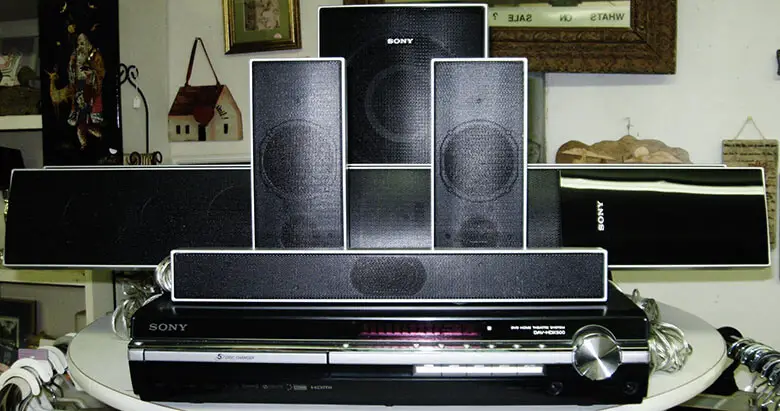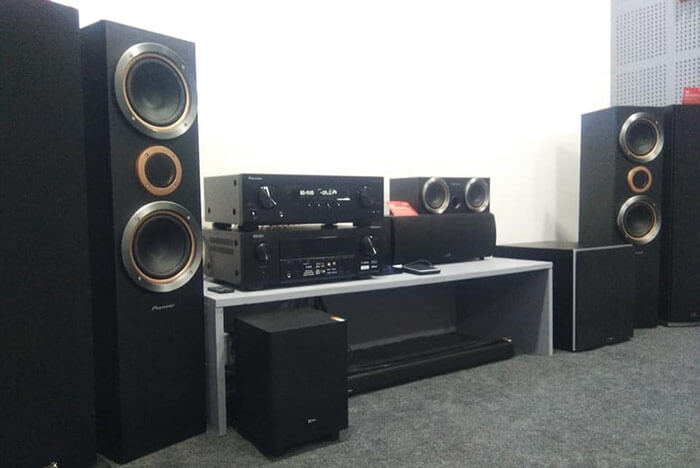If you’re someone who loves the surround system, then the home theater system is your thing. If you seek that complete immersive experience while watching your favorite action movie or listening to loud bassy music, then the home theater system is your thing.
But everything needs to be taken care of, so speakers popping noises from your home theater be a normal thing if you barely have any form of maintenance in it. It could be cable mismanagement, dirty cables, and the insides of the amplifier, or it could be something as simple as putting other electrical devices near the speaker or the amplifiers.
Worry not, as I am here to guide you to prevent your speakers from popping or crackling!
What exactly is a speaker’s popping or crackling sound?

When the audio signals or the electrical signals created through sound waves get interrupted, that is when a popping or crackling sound appear because there is distortion in the energy which will create the sound. And it can happen due to various reasons such as bad cable attachment, changes in amplifier settings, driver issues, equalizer issues, and so much more.
Why Speakers popping noise in home theater
Audio Quality Source
What if the things that you are listening simply has a bad audio source than any other media content you consume. Since the quality of the audio is bad, then naturally, there will be some form of distortions, and those distortions can lead to popping or crackling sounds.
Regardless of the format of the audio, which could be coming from an Mp3, Mp4, or a .flac. Source it can easily happen if the audio is less than 320 kbps. For any high-end HiFi or surround system set up, your audio should be 320 kbps or higher, and in terms of hertz, it can be 44100
Audio or video compression can also be another example of a bad audio quality source. Audio and video contents get compressed after getting transferred from one platform to another, or if the file gets downloaded time after time through many devices, then the files start to compress, and as a result, the quality drops.
Connector Issue
This issue may arise if you own a mixer. You obviously need to connect your mixer to your speaker. So, you take a TRS cable and try to connect it with your mixer. You may now notice that the popping noises start just when you start playing after connecting the TRS cable.
That is because the TRS cable you are using is either faulty or not attached properly, which is why you are constantly getting this buzzing noise.
The best way to troubleshoot this is by attaching the cable to your speakers with the mixer when everything is turned on. That way, the popping sound will be visible to you. It is hard to locate the buzzing sound’s source if you turn on your setup after plugging everything in.
Amplifier incompatible with Speakers
When your speakers are no match with your amplifiers, that is when clipping occurs. Every amplifier has a particular limitation to its voltage or wattage to generate sound. If that limit hits, the sound gets produced, but it comes in a very distorted manner which leads to popping sounds.
This basically means that the sound’s highs and low waves are not moving under proper synchronization, which is why the original sound which you were supposed to hear is getting clipped off. You have an amplifier that is incompatible with your speakers, and it is causing both harm to your speakers and the amplifier.
Fix:
If you are someone who likes to mix speakers with various amplifiers, then you’ve got it all wrong, so I’d suggest you get the combos of amplifiers, receivers, and speakers.
Sound Source incompatible with Home theater

You may be consuming your daily content from various sources, and the contents you consume vary from time to time. You could be watching from satellite cable networks, subscription-based platforms, or DVDs that you have purchased.
But, it would be very foolish of you to demand the same type of audio experience from all of these media platforms because not all of the things you consume will be capable of providing the similar sound you desire.
This means that these platforms won’t always be able to produce surround sound audio because the contents vary instead. Since your system can play surround sound audio, it is now creating distortion or not producing enough sound.
This can surely confuse you to think that your devices are faulty, but it is actually related to the platforms you are using to watch what you enjoy.
Fix:
To prevent this from happening, you simply need to contact your cable operators to set up your set-top box, which goes with your system. Also, make sure you check if the audio is compatible with a home theater system before purchasing a Dvd.
Other than that, if you want to consume your content without distortions, then it is better to change the audio settings to stereo sound.
Overloading and Underloading
When your speakers face wattage which is not in accordance with the speakers, then overloading and underloading happens. If you are using a power amplifier with low-wattage speakers, then it is quite likely that you will face overloading. Your tweeters are supposed to produce high-pitched, high-frequency sounds.
What if the tweeters suddenly get a low-frequency sound? Then clearly, the speakers will produce a lot of distorted sounds. This is the result of overloading.
Overloading is extremely harmful to your system as it could overheat your speakers, leading to coil burning and other electrical problems. If you keep on overloading your system, then chances are, at one point, it will stop producing any sound.
Now, as for underloading, it is when you increase your volume so much that your speakers start to pop and crackle. This happens because your amplifier is not able to generate such a magnitude of volume.
Inside of the Amplifier
If you have been using the same speakers and the same amplifier for years now, then chances are the insides of it have started to become dirty. A good way to identify this is by using the knobs or bars that control the bass or the volume.
Suppose you see that there is distortion while adjusting your volume through the knob. In that case, chances are that the insides have become dirty and aren’t letting the hardware inside of it run smoothly.
Fix:
I’d recommend you get your hands dirty. Use a blower and those instant cleaners. Hopefully, you will notice some changes after putting things back.
Other issues that are related to all types of speakers
Now that I’ve talked to you about the core issue related to the home theater system, I would also like to enlighten you about the other problems that cause popping noise and which is mostly for all types of speakers.
- Driver Issues related to your Pc are quite common. If you play your system through your Pc, then sometimes your settings might malfunction and cause popping sounds.
- Having external electrical devices can also be the culprit to your popping noises. You may hear a long beeping sound before starting your file.
- Another issue can be if you put other cables near your speaker and amplifier cable. This will cause electrical interferences leading to popping and crackling sounds.
- Sometimes popping noises can appear if you even misadjust your equalizer.
These are some of the fundamental issues that make your speakers pop and crackle. If you further like to know more about these issues, then I have just the right thing for you.
Things you may need to get or replace for a better experience:
- If your problem is with the connector, then get the Neutrik TS Silent connector, as it has a turn-off and turn-on switch which will prevent buzzing and crackling sounds.
- To prevent incompatibility between the amplifiers and the speakers, you should probably get a combo that covers all the grounds, something like the Yamaha YHT-5960U.
- To clean the insides of the amplifier or the speaker, it is best to use a Contact Cleaner as it is safe to use for hardware since no wiping is required, and in some cases, it can be sprayed while the device is on.
Frequently Asked Questions
Can I get a popping noise if my settings are reset?
No, in general, you won’t unless you’ve mixed the settings of your amplifiers. Your amplifier and your speakers need to be aligned to produce the optimum, clear, and crisp sound. You may not get a popping noise unless some other plug or device is interfering, but you may not get your desired sound.
Does Equalizer play any role in preventing speakers from popping?
In some instances, it can be because you could be demanding a lot more from your speakers than it can actually provide. So, you are trying to adjust your settings with the equalizer, and it turns out that what you are hearing is worse than ever, along with a lot of crackling sounds.
Will using multiple sources help me identify the problem?
You could be complaining that your device has become faulty and you need to change, but before everything, it is wiser if you try to check your sounds through multiple devices. I always prefer using RCA cables to 3.5 mm jack or RCA to RCA cables to HDMI, Coax, and many other cables.
Why is clipping bad for my speakers?
Clipping your speakers too hard is basically ruining your speakers. It’ll produce sound waves, not in their normal state, which creates all sorts of distortions. If you are clipping too much, then you will damage your speakers due to overheating.
Wrap Up!
Thus, I hope I have been able to enlighten you about this issue. I have tried to cover mainly all the aspects. Starting from the main issues to the other generic issues and the changes you may require. Your issue should be solved within all of the things I have explained to you.
Hence, I now hope that your issue has been resolved and you are now able to have a fully immersive home theater experience.
Thank you, and it has been a pleasure!
